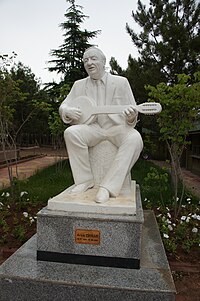Aram Tigran

Aram Tigran (Template:Lang-hy) or Aramê Dîkran (Kurdish rendering from Western Armenian), born Aram Melikyan (Template:Lang-hy), (1934 – 8 August 2009)[1] was a contemporary Armenian singer who sang primarily in Kurdish. Among Assyrians in Qamishlo he was known as Aram Dikran.
Tigran was born in Al-Qamishli in northeastern Syria to a family originally from Diyarbakır. After finishing ninth grade, he concentrated his efforts on learning music and playing Oud and by the age of twenty years, he was singing in four languages: Kurdish, Arabic, Syriac and Armenian.[2] He is considered among the best of contemporary Kurdish singers and musicians.[3] He recorded 230 songs in Kurdish, 150 in Arabic, 10 in Syriac, 8 in Greek.[4]
Tigran died in Athens on August 8, 2009.[5] Tigran wanted to be buried in Diyarbakır in Turkey,[6] but the Turkish authorities refused this request.[7][8]
He had three brothers and two sisters.
Albums
- Çîyayê Gebarê, Aydın Müzik, 2004.
- Zîlan, Aydın Müzik, 2004.
- Serxwebûn Xweş E, Aydın Müzik, 2004.
- Kurdistan, Aydın Müzik, 2004
- Xazî Dîsa Zarbûma
- Rabin
- Evîna Feqiyê Teyran
- Keçê Dinê
- Ey Welato Em Heliyan
- Ay dilberê
- Daye min berde
- Diyarbekira serin
- Aydil
- Em hatin
- Heval Ferat
Notes
- ^ http://www.bianet.org/english/minorities/116375-armenian-kurdish-musician-aram-tigran-to-be-buried-in-diyarbakir
- ^ Interview with Aram Tigran, (in Kurdish).
- ^ Kutay Kugay,The way of Kurdish Music, Sing Out!, Summer 2007.
- ^ http://www.mmo.org.tr/resimler/ekler/d7970532bfa1449_ek.pdf?dergi=413 page:2
- ^ Armenian singer passed away, Global Voices Online, by Onnik Krikorian.
- ^ Armenian and Kurdish Musician Aram Tigran Dies, by Liana Aghajanian, Aug. 2009
- ^ The gold bridge passed away, by Anahit Khatchikian / Roni Alasor, Brussels, Aug. 2009
- ^ Aram Tigran'ın vasiyeti gerçekleşmeyecek, by Hilal Koylu / Umay Aktas Salman, Aug. 2009
